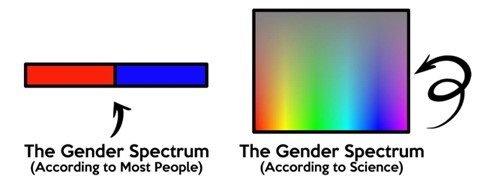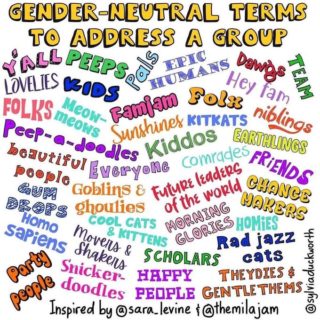If this day didn’t register on your LGBT+ calendar, you’re probably not alone. International Non-Binary People’s Day has only existed since 2012 and some of my enby (non-binary) friends weren’t even aware there was a dedicated day!
The date was chosen to be in July so it’s between International Men’s Day and International Women’s Day, in order to raise awareness for other gender identities that exist.
This is a day to recognise the folks that feel they don’t strictly fit into the binary of male or female. There is no singular way for a non-binary person to express their gender identity. There are as many different places along the gender spectrum as there are flavours of ice cream! Everyone’s gender expression is valid.

Photo credit – autostraddle – A. Stiffler
Enby people have existed throughout history (just as all LGBT and gender-variant people have), we just may not have had the words to describe this previously (or the words existed in other languages and cultures but have been erased). History is littered with those who expressed their gender in ways outside of the strict male/female binary (you just may not have heard about them in history class).
Some examples of gender-diverse cultures
Native American – Two-spirit people, nadleehi, lhamana
Hawaiian – Mahu
Indian – Kinnar people
Mexico – muxes (vestidas and pintadas)
*(Many representations of gender-diverse cultures in history are obscured due to loss of records, colonialism and lack of knowledge or translation/terminology issues. When reading around gender trans, non-binary and other gender identities can overlap or are referred to as the same group of people)*
Currently, enby genders are not recognised in many countries but there is a lot of work being done to improve options and legal recognition of other genders. Only 18 countries in the world currently have other gender options that are legally recognised but even they aren’t perfect.
Most people don’t have to think about their gender much, as their outward expression matches their inner feelings. But for some, the gender identity of male/female is too restrictive. The world is set up to only recognise two options: male or female. When these terms affirm us, we don’t have to think about it, but when they don’t, it becomes obvious how pervasive the binary is.
Male/female, bridegroom, his and hers, Mr. and Mrs are some examples.
Although for some readers this may not be a big thing, when it is a barrier in every interaction of your life, it becomes tiresome.
When I was getting married, to my wife, the forms had ‘groom’ scribbled out. The registry office also apologised for only having one bridal room (I didn’t know what this room was for let alone that a person needed one to get married). Now their forms say partner #1 and #2 instead.
These may be small changes, but they do help move us towards inclusivity for all people by considering the language we use. We can all make small changes by considering including our pronouns in our work correspondence (you can add yours to your email signature for example, as it only takes a couple of minutes).
Respecting other people’s pronouns
If you are ever unsure of a person’s pronouns, “they/them/their” is largely accepted and you can ask the person themselves at an appropriate opportunity. Respect others by using a person’s preferred name and pronouns if/when they ask and accept that you might get it wrong sometimes but that’s ok too!
Respect the person enough to make an effort to use their chosen pronouns. These small steps help to create a more welcoming environment in the workplace and they demonstrate that you are a nonbinary ally. You can also address meetings in more inclusive terms by dropping the “good evening ladies and gentlemen” and opt for a more inclusive opening statement such as “good evening esteemed guests/colleagues/friends/pals.”
Small changes add up and can make a big difference. It all starts with one step to reaching the goal of equality and inclusivity.

Photo credit – Sylvia Duckworth
Related links
- When is International Non-Binary Day in 2020?
- Mourning the Loss of Indigenous Queer Identities
- Gender Variance Around the World Over Time
- Rebel Girls: Waiter, There’s Some Theory in my Gender
- What Native Hawaiian Culture Can Teach us About Gender Identity
- About ALOK
- Review of Nonbinary Gender Identities: History, Culture, Resources
Get involved
Not yet a PDA member?
If you have not yet joined the PDA, we encourage you to join today and ask your colleagues to do the same.
Membership is FREE to pharmacy students, pre-regs and for the first three months of being provisionally registered/newly qualified.
Read about our key member benefits here.